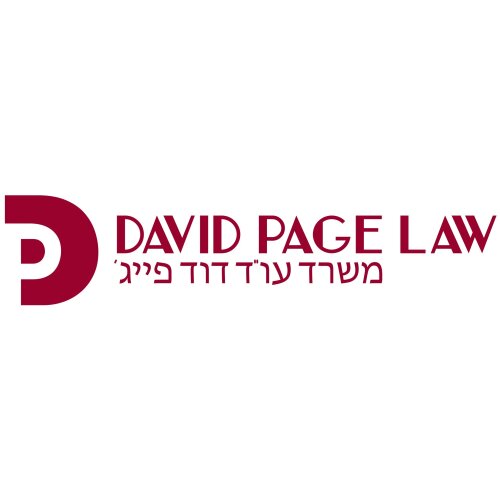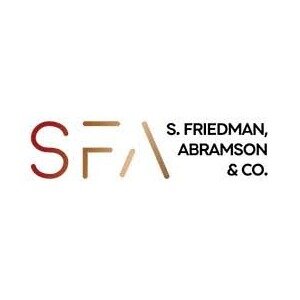Best Renewable & Alternative Energy Lawyers in Jerusalem
Share your needs with us, get contacted by law firms.
Free. Takes 2 min.
List of the best lawyers in Jerusalem, Israel
About Renewable & Alternative Energy Law in Jerusalem, Israel
Jerusalem, as part of Israel, is experiencing significant growth in the field of renewable and alternative energy. Israel’s commitment to reducing dependence on fossil fuels and increasing energy independence has encouraged robust legal and regulatory frameworks supporting solar, wind, biogas, and other alternative energy sources. The government offers various incentives for clean energy projects and promotes innovation in new energy technologies. Legal considerations are crucial for entrepreneurs, property owners, developers, and investors engaging in energy projects within Jerusalem due to complex licensing requirements, environmental regulations, zoning laws, and local authority involvement.
Why You May Need a Lawyer
Legal advice can be essential for anyone involved in renewable or alternative energy initiatives in Jerusalem. Common situations where legal help is needed include:
- Obtaining permits and licenses for building or operating energy projects.
- Navigating real estate, zoning, and land use issues for solar panels or wind turbines.
- Drafting and reviewing contracts for the sale, purchase, or installation of energy technology.
- Securing government incentives, grants, or financing for renewable energy projects.
- Ensuring compliance with environmental and safety regulations.
- Resolving disputes with contractors, partners, or local authorities.
- Protecting intellectual property related to new energy technologies.
Local Laws Overview
Renewable and alternative energy in Jerusalem are governed by both national and municipal laws:
- The Israeli Electricity Sector Law regulates the production, transmission, and distribution of electricity, including from renewable sources.
- Israel’s Planning and Building Law addresses zoning and permits required for energy projects within Jerusalem’s unique cityscape.
- Environmental laws, particularly the Clean Air Law and various Ministry of Environmental Protection regulations, apply to all energy installations and require environmental impact assessments.
- The Jerusalem Municipality sets additional criteria for solar roof installations, historical building preservation, and integration with urban planning objectives.
- Incentive programs, such as feed-in tariffs and grants, are administered by government agencies to support renewable energy investment.
Frequently Asked Questions
What types of renewable energy projects are most common in Jerusalem?
Solar energy is the most common, especially rooftop solar panels, but there are also small projects in wind and biogas.
What permits are required for installing solar panels in Jerusalem?
You need permits from the Jerusalem Municipality for building modifications and approval from the Israel Electric Corporation to connect to the grid.
Are there government grants or incentives for renewable energy projects?
Yes, several grants, loans, and feed-in tariffs are available from Israeli government ministries and agencies for those investing in renewable energy.
Can renewable energy devices be installed on historical buildings?
Installation is possible but subject to strict limitations and additional approvals to preserve Jerusalem's historical landmarks.
What environmental assessments are required?
Most projects require an environmental impact assessment or declaration to ensure compliance with environmental laws and standards.
Are there specific building codes for renewable energy installations?
Yes, building codes in Jerusalem set standards for safety, integration, and access, and must be strictly observed.
Do residents of apartment buildings need special permission?
Typically, residents must obtain the consent of the residents committee and sometimes approval from the building’s managing company.
What happens if my renewable energy installation causes a dispute with neighbors?
Such disputes are usually mediated by local authorities or, if needed, resolved through legal proceedings based on nuisance and zoning laws.
Can excess energy be sold back to the grid?
Yes, Israel operates a feed-in tariff system allowing approved projects to sell surplus energy to the Israel Electric Corporation.
Is it necessary to involve a lawyer for small home installations?
While not always legally required, consulting a lawyer ensures your project follows regulations, avoids fines, and qualifies for incentives.
Additional Resources
The following organizations and governmental bodies provide information, regulations, and support for those interested in renewable and alternative energy projects in Jerusalem:
- Ministry of Energy - National policies and incentive programs.
- Ministry of Environmental Protection - Environmental guidelines and permits.
- Jerusalem Municipality - Local permits, zoning, and historical preservation issues.
- Israel Electric Corporation - Grid connection and feed-in tariffs.
- Israeli Renewable Energy Association - Industry insights and advocacy.
- Israel Green Building Council - Guidance on green construction and energy efficiency.
Next Steps
If you are considering a renewable or alternative energy project in Jerusalem, gather as much preliminary information as possible regarding your location, building plans, and intended energy output. Identify which permits or incentives may apply to your project. Next, consult with a lawyer experienced in Israeli energy law to assess regulatory requirements, draft or review contracts, and represent your interests before government agencies. Legal experts can help you prevent pitfalls, maximize your project’s value, and ensure full compliance with all local, municipal, and national regulations. Starting with professional legal guidance sets the foundation for a successful and sustainable energy venture in Jerusalem.
Lawzana helps you find the best lawyers and law firms in Jerusalem through a curated and pre-screened list of qualified legal professionals. Our platform offers rankings and detailed profiles of attorneys and law firms, allowing you to compare based on practice areas, including Renewable & Alternative Energy, experience, and client feedback.
Each profile includes a description of the firm's areas of practice, client reviews, team members and partners, year of establishment, spoken languages, office locations, contact information, social media presence, and any published articles or resources. Most firms on our platform speak English and are experienced in both local and international legal matters.
Get a quote from top-rated law firms in Jerusalem, Israel — quickly, securely, and without unnecessary hassle.
Disclaimer:
The information provided on this page is for general informational purposes only and does not constitute legal advice. While we strive to ensure the accuracy and relevance of the content, legal information may change over time, and interpretations of the law can vary. You should always consult with a qualified legal professional for advice specific to your situation.
We disclaim all liability for actions taken or not taken based on the content of this page. If you believe any information is incorrect or outdated, please contact us, and we will review and update it where appropriate.















